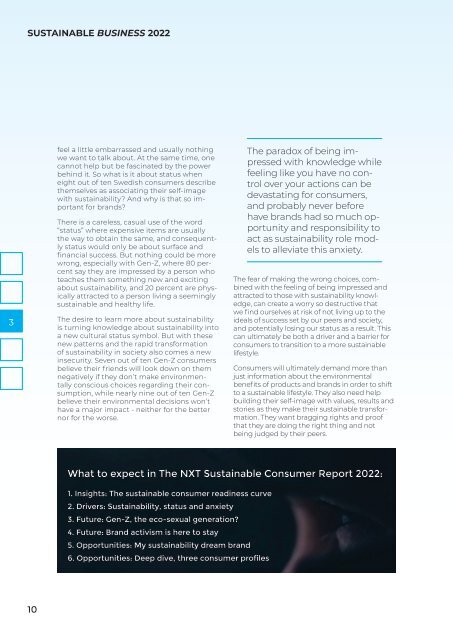EDM Sustainable Business 2022
EDM Business editions represents the board-level conversation in multichannel retail focussing commercial growth and connection with the digital, demanding consumer.
EDM Business editions represents the board-level conversation in multichannel retail focussing commercial growth and connection with the digital, demanding consumer.
You also want an ePaper? Increase the reach of your titles
YUMPU automatically turns print PDFs into web optimized ePapers that Google loves.
SUSTAINABLE BUSINESS <strong>2022</strong><br />
1<br />
2<br />
3<br />
4<br />
5<br />
feel a little embarrassed and usually nothing<br />
we want to talk about. At the same time, one<br />
cannot help but be fascinated by the power<br />
behind it. So what is it about status when<br />
eight out of ten Swedish consumers describe<br />
themselves as associating their self-image<br />
with sustainability? And why is that so important<br />
for brands?<br />
There is a careless, casual use of the word<br />
“status” where expensive items are usually<br />
the way to obtain the same, and consequently<br />
status would only be about surface and<br />
financial success. But nothing could be more<br />
wrong, especially with Gen-Z, where 80 percent<br />
say they are impressed by a person who<br />
teaches them something new and exciting<br />
about sustainability, and 20 percent are physically<br />
attracted to a person living a seemingly<br />
sustainable and healthy life.<br />
The desire to learn more about sustainability<br />
is turning knowledge about sustainability into<br />
a new cultural status symbol. But with these<br />
new patterns and the rapid transformation<br />
of sustainability in society also comes a new<br />
insecurity. Seven out of ten Gen-Z consumers<br />
believe their friends will look down on them<br />
negatively if they don’t make environmentally<br />
conscious choices regarding their consumption,<br />
while nearly nine out of ten Gen-Z<br />
believe their environmental decisions won’t<br />
have a major impact - neither for the better<br />
nor for the worse.<br />
The paradox of being impressed<br />
with knowledge while<br />
feeling like you have no control<br />
over your actions can be<br />
devastating for consumers,<br />
and probably never before<br />
have brands had so much opportunity<br />
and responsibility to<br />
act as sustainability role models<br />
to alleviate this anxiety.<br />
The fear of making the wrong choices, combined<br />
with the feeling of being impressed and<br />
attracted to those with sustainability knowledge,<br />
can create a worry so destructive that<br />
we find ourselves at risk of not living up to the<br />
ideals of success set by our peers and society,<br />
and potentially losing our status as a result. This<br />
can ultimately be both a driver and a barrier for<br />
consumers to transition to a more sustainable<br />
lifestyle.<br />
Consumers will ultimately demand more than<br />
just information about the environmental<br />
benefits of products and brands in order to shift<br />
to a sustainable lifestyle. They also need help<br />
building their self-image with values, results and<br />
stories as they make their sustainable transformation.<br />
They want bragging rights and proof<br />
that they are doing the right thing and not<br />
being judged by their peers.<br />
What to expect in The NXT <strong>Sustainable</strong> Consumer Report <strong>2022</strong>:<br />
1. Insights: The sustainable consumer readiness curve<br />
2. Drivers: Sustainability, status and anxiety<br />
3. Future: Gen-Z, the eco-sexual generation?<br />
4. Future: Brand activism is here to stay<br />
5. Opportunities: My sustainability dream brand<br />
6. Opportunities: Deep dive, three consumer profiles<br />
10


